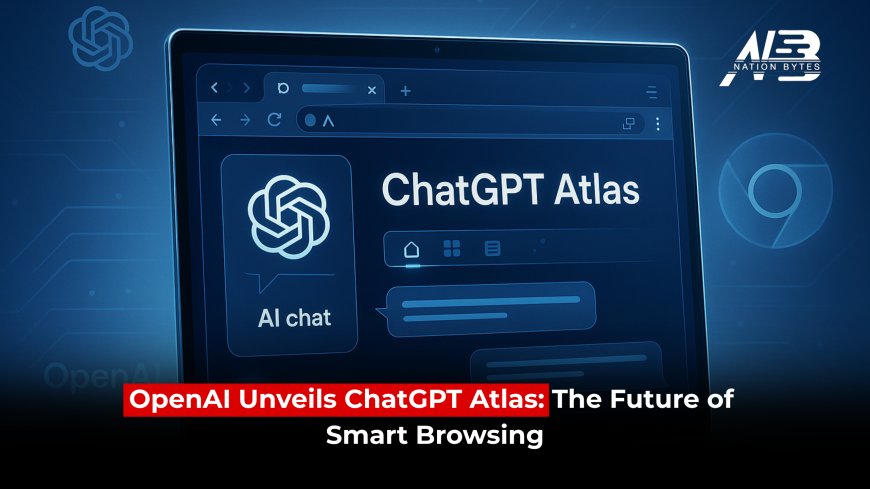OpenAI Unveils ChatGPT Atlas: The Future of Smart Browsing
OpenAI launches ChatGPT Atlas, an AI-powered browser redefining how users search, learn, and interact online

In a major leap for artificial intelligence and web experience, OpenAI has officially launched its first-ever web browser ChatGPT Atlas. Designed to merge human-like intelligence with fast, privacy-centric browsing, Atlas is set to transform how users search, learn, and interact online.
Launched globally in October 2025, ChatGPT Atlas is currently being rolled out in stages for ChatGPT Plus and Enterprise users, with public access expected in early 2026.
What Makes ChatGPT Atlas Different?
Unlike traditional browsers such as Chrome, Safari, or Edge, Atlas combines real-time web access, conversational understanding, and task automation all within a single intelligent interface.
Here’s what makes it stand out:
-
AI-Driven Search: Instead of typing keywords, users can ask questions naturally, and Atlas provides real answers not just links.
-
Integrated ChatGPT: The browser uses GPT-5’s reasoning and contextual abilities to summarize pages, explain code, and write directly inside tabs.
-
Privacy-First Design: OpenAI promises that Atlas won’t track personal data or sell user information, aligning with growing global concerns about online privacy.
-
Multi-Tasking Interface: Users can split-screen AI chat, browsing, and note-taking ideal for research, writing, or creative workflows.
Key Features That Redefine Browsing
| Feature | Description |
|---|---|
| AI Assistant Mode | Lets users chat directly with websites, summarize content, and perform quick actions. |
| Smart Tabs | Tabs “remember” context — like your current project, document, or research thread. |
| Privacy Sandbox | No cookies, no trackers, complete local encryption for browsing data. |
| Real-Time Knowledge Access | The browser connects directly to the web for live, factual updates. |
| Cross-App Integration | Works with Microsoft 365, Google Docs, and Notion for seamless workflows. |
Designed for Productivity and Research
OpenAI describes Atlas as a “thinking companion for the web.”
Students, journalists, developers, and business professionals can use it to summarize research papers, generate reports, analyze trends, and even auto-draft content based on verified sources.
For instance, a journalist researching climate data can ask Atlas to:
“Summarize the latest IPCC findings and show the most credible media coverage.”
Atlas will then fetch real-time reports, cross-verify them, and deliver concise, sourced summaries all within seconds.
Security and Transparency Come First
Atlas runs on OpenAI’s privacy-engineered model, ensuring minimal data retention. All user sessions are end-to-end encrypted, and activity logs can be cleared locally.
According to OpenAI engineers, no browsing history or prompts are used to train future models a key concern addressed transparently in their latest policy update.
Early Access and Availability
Currently, ChatGPT Atlas is available in beta for macOS and Windows users, with mobile support in development.
It’s directly integrated into the ChatGPT app, allowing users to toggle between “Chat Mode” and “Browse Mode.”
Early feedback suggests that Atlas feels faster, smarter, and more contextual than competitors, giving users real control over both information and interaction.
Industry Experts React
Tech analysts call Atlas “the most human browser ever built.”
According to Wired’s review, it could “reshape how we perceive web search itself replacing keywords with natural conversation.”
Meanwhile, developers are praising its open API integration, which allows plugins, automation tools, and AI workflows to run directly in-browser making it more like an AI operating system than a traditional browser.
The Bigger Picture
With Atlas, OpenAI enters direct competition with tech giants like Google, Microsoft, and Apple, all racing toward AI-native browsing.
However, OpenAI’s approach focuses less on ads and more on user agency, data control, and intelligent design a shift that could redefine the digital ecosystem.
Final Thoughts
ChatGPT Atlas marks the beginning of a new internet era one where browsing becomes conversational, intelligent, and deeply human.
If OpenAI continues on this path, Atlas might not just compete with Chrome it could change how we experience the web altogether.
For more updates , Visit Nation bytes

 Israr Ahmed
Israr Ahmed